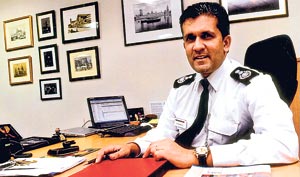Most of us, with, thankfully, little experience of the fire service, tend to persist with a stereotypical view that the fire fighters’ main role is being on standby for when the alarm goes off and they hare off in their engines, just like Fireman Sam.
However a visit to meet the new chief fire officer at the largest fire service in England and Wales – the West Midlands – swiftly dispels some of these crusty prejudices.
For a start, Vij Randeniya, the chief fire officer is, himself, about as unlikely a stereotype as you could find. Not only is he the first ethnic minority fire chief in England and has studied at the National School of Government, he is also a history graduate whose specialism is Hitler’s Waffen SS.
Part of the research involved poring over the Nuremberg War Crimes Tribunal, at London’s Imperial War Museum. Vij is also an admirer of the late US president, John F. Kennedy, and has all 26 volumes of the Warren Commission report into his 1963 assassination.
In his office in fire HQ in Birmingham, Vij explains that the modern fire service has long-moved on from popular imagination.
He says: “Few people have experience of the fire service. They think we just wait around to be called. And no, there are no beds here either.”
Much of the service’s work is prevention, with some 50,000 calls a year to private homes. “Smoke detectors don’t stop fires – the key part is education,” he continues.
But there is also serious analysis behind the prevention drive. Socioeconomic classes C and D tend to have the highest fire incidents, and so the focus is on these areas.
“We identify types of people, types of areas,” says Vij. ‘Half-a-million sets of data are overlaid with indexes of deprivation. People in poorer areas are less aware, have less time, have cheap electrical goods, use more chip pans, and smoke more. And migrant families often cook in pans with a lot of fat.”Fire fighters’ own visits to such areas are often, of course, duplicated by other parts of the public sector. “We’ve identified the same profile for health inequalities, education achievement, higher crime levels and so on. We need to join up better.
He argues, however, that the fire service is a good brand, seen as neutral by householders in such areas and, therefore, more receptive to other messages it may bring them.
 |
| Vij Randeniya: Pic courtesy The Birmingham Post |
“We’ve a trusted brand in the fire service – people are always grateful. And because we do home safety checks, it means we can get across the doorstep and refer back to other agencies. But we have to be impartial.”
Vij, the son of a principal officer in IT at Lewisham LBC, studied modern history, graduating in 1981, and later joined the fire service ‘by chance’. For two years, he never even revealed he was a graduate. He worked in Brixton, was station officer in east London and, in Nottingham, joined the corporate team for the first time.
Later, in 2004, he became deputy CFO at the West Midlands, and studied management at the National School of Government.
Despite his education, Vij maintains it is still important that chief fire officers come from a uniformed background, in contrast to some suggestions that the post can be filled by managers, rather than from the ranks.
He argues: ‘We have specialists here in IT and HR, but the problem is that a non-uniformed chief can’t command a major incident. “The press want to see a uniform not a suit. You can, of course, have a non-uniformed chief with a uniformed deputy, but I don’t accept that a chief fire officer can do the job with such a major competence missing.”
In that respect, as he admits, he believes in ‘tradition, but with a cutting edge’.
A major incident requiring his presence would be a fire involving 25 engines, where “we need a wide-angle lens, because the press and politicians are there”. The impact of such a fire is also cross-sector covering police, council and health services. He commanded such an incident two years ago, as deputy at a fire in Walsall.
As a result, he is on bleeper call 24 hours a day outside his working hours of 8 a.m. to 7 p.m., not only in case of a major incident but also should a fire involve fatalities. The only time he steps away from his work is on holiday. Time presumably to catch up on some history reading.
(Courtesy -The Management Journal - UK) |

